
DHAKA, Bangladesh (CIMMYT) – Scientists from across South and Southeast Asia launched a new agenda earlier this week to boost community involvement in developing climate information and extension messaging services across the region.
“Key to climate services is emphasis on the service,” said Timothy Krupnik, a systems agronomist at the International Maize and Wheat Improvement Center (CIMMYT) and South Asia project leader for Climate Services for Resilient Development (CSRD).
Researchers know how the region’s farmers will be affected by climate change thanks to the development of climate models and other analyses, but there still is a lack of a strong support system that allows farmers to practically use this information.
“We must be able to rapidly extend information to farmers and others who require climate information to inform their decision making, and to assure that research outputs are translated in an easy to understand way that communicates to farmers, extension workers and policy makers,” said Krupnik. “Equally important is feedback from farmers on the quality of climate services so they can be adapted and improved over time.”
The researchers, who gathered in Dhaka, Bangladesh for a three-day workshop from September 17-19, 2017, evaluated how climate and agricultural extension advisories are currently produced and conveyed, and identified opportunities on how to improve these services for farming communities across Bangladesh, India, Indonesia, Myanmar, Nepal, Philippines, Sri Lanka and Vietnam.
“CSRD’s activities are relevant to the U.S. government’s commitment to building resilience of smallholder farmers and to ensure increased production, as well bolster country resilience,” said David Westerling, acting economic growth office director and Feed the Future team leader for the United States Agency for International Development’s mission in Bangladesh. “That is why we are behind this effort.”
During the workshop, delegates assessed different ways to incorporate seasonal climate forecasts into farmer decision making, using several African countries as examples. For example, participants learned how to simply but effectively depict probabilistic forecasts in graphs to farmers during a group work discussion.
There were also experience sharing sessions on information and communication technology (ICT) in agricultural climate services. Giriraj Amarnath, researcher at the International Water Management Institute, Ishwor Malla, service director for ICT at Agri Private Limited and Md. Nadirruzzaman, assistant professor at the Independent University, Bangladesh indicated that ICT can be a cost-effective approach to transfer information to farmers who can, in turn, improve crop productivity using climate information shared their observation and experiences.
While ICT can serve as an important tool, participants emphasized the need for more face-to-face extension and interaction with farming communities to build trust in forecasts that would otherwise not be fully understood by downloading a mobile application or receiving an SMS message.
An analysis to identify strengths, weaknesses, opportunities and threats for climate services in each country and across countries was completed to examine how participants can collaborate in south-south exchanges to support ongoing work in agricultural climate services.
On the last day of the workshop, climate index-based agricultural insurance was also discussed, after which participants proposed new institutional arrangements to improve agricultural climate information flow to farmers in each of their countries.
Elisabeth Simelton, climate change scientist at the World Agroforestry Centre in Vietnam and project manager at the Consortium Research Program on Climate Change, Agriculture, and Food Security (CCAFS), said the workshop provided an interesting platform where scientists and climate service providers from different countries were able to meet and exchange their experiences and ideas through interactive formats, so that everybody can take something new and useful back to their respective countries.
The Climate Services for Resilient Development (CSRD) is a global partnership that connects climate science, data streams, decision support tools, and training to decision-makers in developing countries.The workshop was sponsored by the United States Agency for International Development on behalf of CSRD and is collaboratively organized by CIMMYT and CSRD through the SERVIR Support Team. This work was also implemented as part of the CGIAR Research Program on CCAFS. Read more about the workshop, participants and sponsors here.
At this year’s UN Climate Talks, CIMMYT is highlighting innovations in wheat and maize that can help farmers overcome climate change. Follow @CIMMYT on Twitter and Facebook for the latest updates.
 Climate adaptation and mitigation
Climate adaptation and mitigation